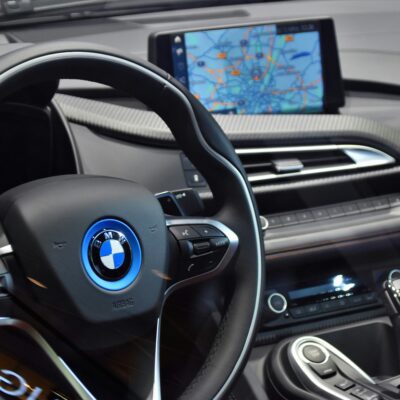Welcome to a journey through time and innovation as we delve into the fascinating history of electric cars and their impact on our environment. From their humble beginnings to the cutting-edge advancements of today, electric vehicles have come a long way in shaping the future of transportation. Join us as we uncover the past, present, and future of these eco-friendly marvels on wheels.
The Invention of the Electric Car: A Brief History
The inception of the electric car dates back to the early 19th century when inventors like Robert Anderson and Thomas Davenport experimented with battery-powered vehicles. However, it was in the late 1800s that William Morrison created one of the first practical electric cars in America.
By the turn of the 20th century, electric cars gained popularity for their quiet operation and ease of use, especially among affluent city dwellers. The Detroit Electric Model 47 even boasted an impressive range of up to 80 miles on a single charge.
During this time, advancements in internal combustion engines overshadowed electric vehicles’ development due to cheaper gasoline prices and longer driving ranges offered by gas-powered cars. Despite this setback, electric cars continued to evolve over the decades, paving the way for modern sustainable transportation solutions.
The Rise and Fall of Electric Vehicles in the Early 20th Century
In the early 20th century, electric vehicles were all the rage. They were quiet, clean, and easy to operate – a promising alternative to their noisy and polluting gasoline counterparts. Electric cars gained popularity among urban dwellers for their efficiency and lack of emissions.
However, as advancements in internal combustion engines took center stage, electric vehicles began to lose ground. The discovery of vast oil reserves fueled the mass production of gasoline-powered cars, leading to a decline in the market share of electric vehicles.
Despite their initial setback, electric cars never truly disappeared. With growing concerns over air pollution and climate change in recent years, there has been a resurgence of interest in electric vehicles as a sustainable transportation option for the future.
As we look back at the rise and fall of electric vehicles in history, it’s clear that they are now poised for a remarkable comeback with advancements in technology and increasing environmental awareness shaping the automotive industry’s landscape once again.
Environmental Benefits of Electric Cars
Electric cars have been gaining popularity due to their significant environmental benefits. One of the key advantages is their zero emissions, helping to reduce air pollution and combat climate change. By running on electricity rather than gasoline, electric vehicles contribute less to greenhouse gas emissions.
The use of electric cars also helps in reducing our dependence on fossil fuels, which are finite resources that harm the environment when extracted and burned for energy. Additionally, electric vehicles operate more efficiently than internal combustion engine vehicles, leading to lower energy consumption per mile traveled.
Moreover, with the increasing shift towards renewable energy sources like solar and wind power, charging electric cars becomes even more environmentally friendly. This transition to cleaner energy sources further enhances the sustainability of electric vehicles as an eco-friendly transportation option.
The environmental benefits of electric cars play a crucial role in promoting a greener future and mitigating the negative impacts of traditional gasoline-powered vehicles on our planet’s health.
Challenges and Limitations of Electric Cars
As much as electric cars have come a long way in terms of innovation and technology, there are still some challenges and limitations that need to be addressed. One major concern is the range anxiety that many potential buyers have – the fear of running out of battery power before reaching their destination. This issue can deter people from making the switch to electric vehicles.
Another challenge is the lack of a widespread charging infrastructure, especially in rural areas or apartment complexes where installing a home charger might not be feasible. It can be frustrating for EV owners to find available charging stations, causing inconvenience and delays during long journeys.
Moreover, the upfront cost of purchasing an electric car is often higher than traditional gasoline-powered vehicles, although this gap is narrowing with advancements in battery technology. Additionally, the manufacturing process of lithium-ion batteries used in electric cars raises environmental concerns due to mining practices and disposal at end-of-life.
While there are obstacles to overcome, it’s important to acknowledge these challenges as opportunities for further improvement and development in the electric vehicle industry.
Future of Electric Cars: Advancements and Innovations
As technology continues to evolve at a rapid pace, the future of electric cars looks increasingly promising. Advancements and innovations in battery technology are extending driving ranges and reducing charging times, making electric vehicles more convenient and practical for everyday use.
Manufacturers are investing heavily in research and development to push the boundaries of what is possible with electric cars. From sleek designs to enhanced performance capabilities, the next generation of electric vehicles is set to revolutionize the automotive industry.
Innovations such as wireless charging technology and vehicle-to-grid integration are paving the way for a more efficient and sustainable transportation system. As infrastructure expands to support these advancements, electric cars will become even more accessible to consumers around the world.
With major players in the industry committing to phasing out internal combustion engines in favor of electrification, it’s clear that electric cars are here to stay. The future holds endless possibilities for how we drive, travel, and interact with our environment – all powered by electricity.
Government Incentives and Policies for Promoting Electric Vehicles
Government incentives and policies play a crucial role in promoting the adoption of electric vehicles. By offering tax credits, rebates, and grants to buyers, governments can make electric cars more affordable for the general public. These financial incentives help offset the higher initial cost of purchasing an electric vehicle compared to a traditional gas-powered car.
In addition to financial support, governments can also implement policies like zero-emission vehicle mandates and emissions regulations that encourage automakers to produce more electric vehicles. By setting targets for reducing greenhouse gas emissions from transportation, authorities push car manufacturers towards developing cleaner and more sustainable technologies.
Moreover, investing in charging infrastructure is another way governments can support the growth of electric vehicles. Building more public charging stations and providing incentives for installing home chargers make it easier for EV owners to recharge their vehicles conveniently.
Government initiatives are essential in accelerating the transition towards a greener transportation system powered by electric vehicles.
Why Electric Cars are the Future of Transportation
Electric cars have come a long way since their inception, facing challenges and overcoming limitations to become a viable option for sustainable transportation. With advancements in technology, government incentives, and growing environmental concerns, electric vehicles are positioned to revolutionize the way we move in the future.
As we look ahead, it’s clear that electric cars offer a cleaner and greener alternative to traditional gasoline-powered vehicles. Their impact on reducing greenhouse gas emissions and air pollution cannot be understated. The shift towards electric mobility is not just a trend but a necessity to combat climate change and create a more sustainable world for future generations.
With ongoing research and development driving innovation in battery technology, charging infrastructure, and vehicle design, the future of transportation is electric. As more automakers invest in electrification and governments implement policies to incentivize adoption, we can expect to see an acceleration in the transition towards zero-emission vehicles.
In conclusion [removed], electric cars are not just the future of transportation; they are the key to building a cleaner, healthier planet for all. Embracing this shift towards sustainable mobility will not only benefit our environment but also lead us towards a brighter and more sustainable future. So let’s charge ahead with electric vehicles paving the way for a greener tomorrow!





